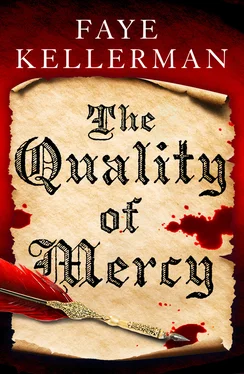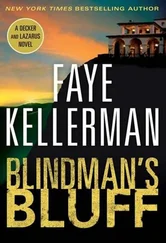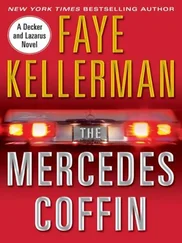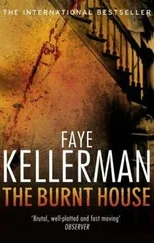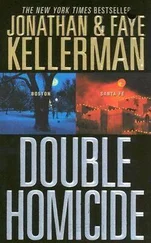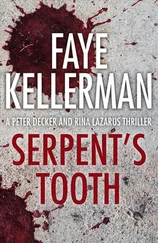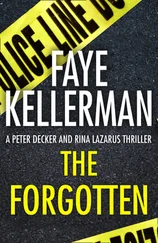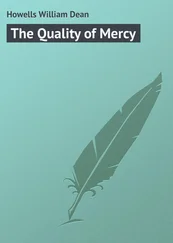“Take it, Father.”
“Marry, no!” he said. “I wouldn’t think of such a thing, Becca.”
She was taken aback by the vehemence of his refusal.
“I’m flattered by your offer, Rebecca,” he explained. “Tis simply to say that the ring is yours.”
“It would do me pleasure if I could give it to you.”
“No, daughter, I cannot take it,” he said. “But I see your heart is pure with kindness toward me. The next time we minister to the Queen, you must wear it.” He slipped it back in Rebecca’s bag and kissed her red, wet cheek. “Such a splendid piece of jewelry. Then you’ve still much favor with the Queen.”
“She said I may come to court anytime.”
“Then her invitation is still—”
“Father,” Rebecca implored in a whisper, “do not force me! I pray you with all my heart, Father, please do not compel me to go.”
She began to sob again.
“Becca, my love …” Roderigo cleared his throat, touched by her emotional cries. “No one will force you to leave the family you hold so dear. But you must tell me why. You’ve always been so headstrong, so independent, having shown in the past no need of my advice or assistance. Explain yourself to me.”
Rebecca was silent. How could she begin to tell him? Of the Queen and her perverted ways. Of her foul breath, slimy hands, and serpentine tongue. Her father wouldn’t believe her, no matter how she’d insist it to be the truth. The worst insult under heaven—to be called a liar.
“I cannot express it into words.” She wiped her tears with her handkerchief and sniffed the spicy aroma of her pomander. Would that it could remove the stench of the old woman from her nostrils. And Rebecca knew that odor was not a condition of advanced age. Grandmama smelled as sweet as the rosewater she bathed in.
Roderigo hugged her again. “Never mind. As long as the Queen bears no ill will toward you.”
Or to me .
“None whatsoever, Father. I assure you.”
Rebecca had made certain of that. She’d accommodated the Queen’s every whim, quenched her every desire. The memories made her weak in the stomach.
Roderigo put his mouth against his daughter’s ear and whispered, “She really is a wretched old harpie, is she not?”
For the first time in twenty-four hours, Rebecca smiled sincerely.
Chapter 11 Chapter 11 Chapter 12 Chapter 13 Chapter 14 Chapter 15 Chapter 16 Chapter 17 Chapter 18 Chapter 19 Chapter 20 Chapter 21 Chapter 22 Chapter 23 Chapter 24 Chapter 25 Chapter 26 Chapter 27 Chapter 28 Chapter 29 Chapter 30 Chapter 31 Chapter 32 Chapter 33 Chapter 34 Chapter 35 Chapter 36 Chapter 37 Chapter 38 Chapter 39 Chapter 40 Chapter 41 Chapter 42 Chapter 43 Chapter 44 Chapter 45 Chapter 46 Chapter 47 Chapter 48 Chapter 49 Chapter 50 Chapter 51 Chapter 52 Chapter 53 Chapter 54 Chapter 55 Chapter 56 Chapter 57 Chapter 58 Chapter 59 Chapter 60 Chapter 61 Chapter 62 Chapter 63 Historical Summary Keep Reading About the Author Faye Kellerman booklist About the Publisher
Christopher Mudd had caught his coney—an old windbag of a knight sorely drunk on cheap booze. The dupe was fat with a honey-tipped beard and surprisingly spindly legs. Wearing a scarlet doublet and brown hose, the gallant looked like an apple perched atop two wooden sticks.
A bene gull he’d be, thought Mudd. He thanked the stars for his good hap and prayed that there were many coins in the coney’s purse—enough to please the master. Ye Gods, Mackering had been in a fierce mood of late, constantly cursing, smacking him for bringing in too little money. Waving the sharp dagger in front of his nose and threatening to cut it off.
Mudd shuddered at the thought.
He’d worked for Mackering for five years, his specialty tricks of falling: the spoon drop, the madman, the drunk, the one inflicted with falling sickness. The master had been a decent jack in the past, but now he’d turned into a rabid dog—biting without cause.
All because of that player, Harry Whitman. Tush, was Mudd sorry that he’d come with the master on the high roads up North. Mackering had changed for the worse since that fateful day, the day they’d cheated Whitman at dice. He’d become fretful with a temper that exploded like rain clouds.
Mudd sighed and rubbed his nose, appreciating its wholeness. May his hap stay good, may the coney’s purse be heavy tonight.
It wasn’t too long before the gull stumbled out of the tavern, his arms looped around a clubfooted jack, the two of them singing loudly about a whore of Greenwich. The dupe’s companion was thin and seemed to be having a hard time keeping the lardish knight afoot.
Mudd wondered how much he could cheat out of the sod. Two shillings? Maybe three, if luck be a sweet wench. He had watched the knight for at least an hour, and the gallant had spent freely, buying sack for all those interested in being bored by his tales. The night might prove very good indeed. Maybe, then, with his hands filled with shillings, Master Mackering would be satisfied.
The two dolts stopped. A moment later the knight undid his codpiece and pissed against the side of the alehouse. Now was Mudd’s chance. He approached the fat man with an unsteady gait, swaying markedly as if he, too, were inebriated. At the correct moment he bumped into the gallant, bounced to his right and stumbled to the ground.
“A thousand pardons, good sir.” Mudd spoke loudly, slurring his words.
The gallant looked at Mudd’s torn clothes and dirty face and sneered.
“Watch where you’re going, cur!” he yelled, trying to reattach his dangling codpiece.
“A thousand and thousand pardons, my good sir,” Mudd answered. He attempted to upright himself and again fell to the ground.
“Nothing so repulsive as one who cannot hold his drink,” remarked the dupe’s crippled companion.
“Where are the constables when they are needed?” the gallant boomed. He was fully dressed now, tripping over his feet but not falling. “Constable! Constable!”
“Try the watchmen,” suggested the man with the clubfoot.
“Tis a bonny idea,” agreed the knight. “Watchman! Watchman!” He leaned against the cripple and his weight knocked both of them over.
“Stupid sot,” the knight said to Mudd. “Now see what you’ve done!” He managed to stand up, and pulled Clubfoot to his feet. “Are you well, sir?” the knight asked his companion, brushing dust off his sleeves.
“Aye, quite well,” Clubfoot said. He hobbled around in a circle. “No thanks to this churl!”
“Out of my sight before I step on you, beggar,” the gallant said, nudging Mudd’s stomach with the tip of his boot. “Watchman! Constable! Watchtable!”
“Now, a God’s will,” Mudd said, “what have I found?” He picked up a piece of paper and unwrapped it. A gilt spoon spilled to the ground.
The gallant’s eyes widened.
Mudd stared stuporously at the item, then picked it up. “What shall I do with such a geegaw?” he asked.
“Sir,” the cripple said. “I marvel at your good luck!”
“Good luck?” Mudd acted confused. “What good is this?”
The gallant smiled. “Let me help you to your feet, dear man.”
Mudd was yanked upward. He recoiled from the fat knight’s breath, reeking of garlic and cheap sack.
Clubfoot said, “Sir, that geegaw is worth—”
The gallant said, “Sir, you have found a trinket worth nothing.”
“My luck,” Mudd pouted. “Marry, I wish someone else would have found this. What shall I do with such trumpery?”
The knight brushed the dirt off Mudd’s shredded jerkin. “I shall take it off your hands.”
“Nay, perhaps I shall give it to my mother!” Mudd swayed on his feet. “Perhaps I shall give it to my sister.” He stared at it and examined it closely. “Perhaps I shall throw it away. Would I have a crown instead of such a silly toy?”
Читать дальше
